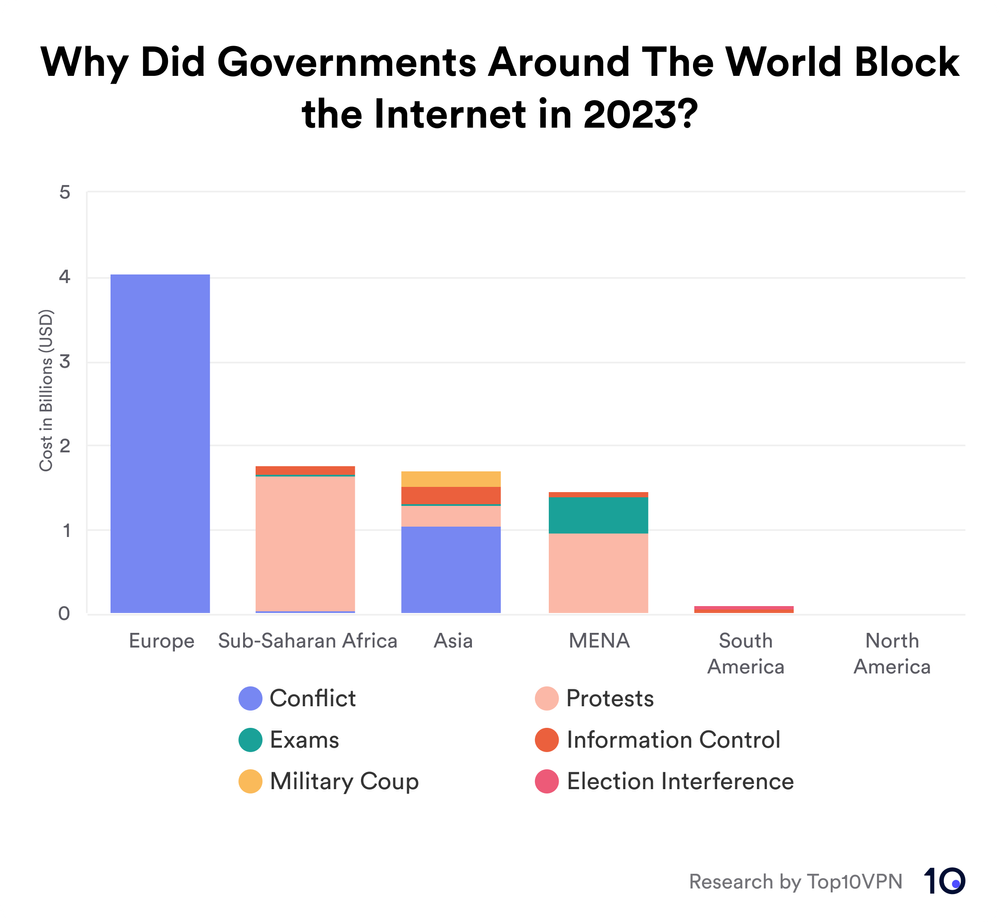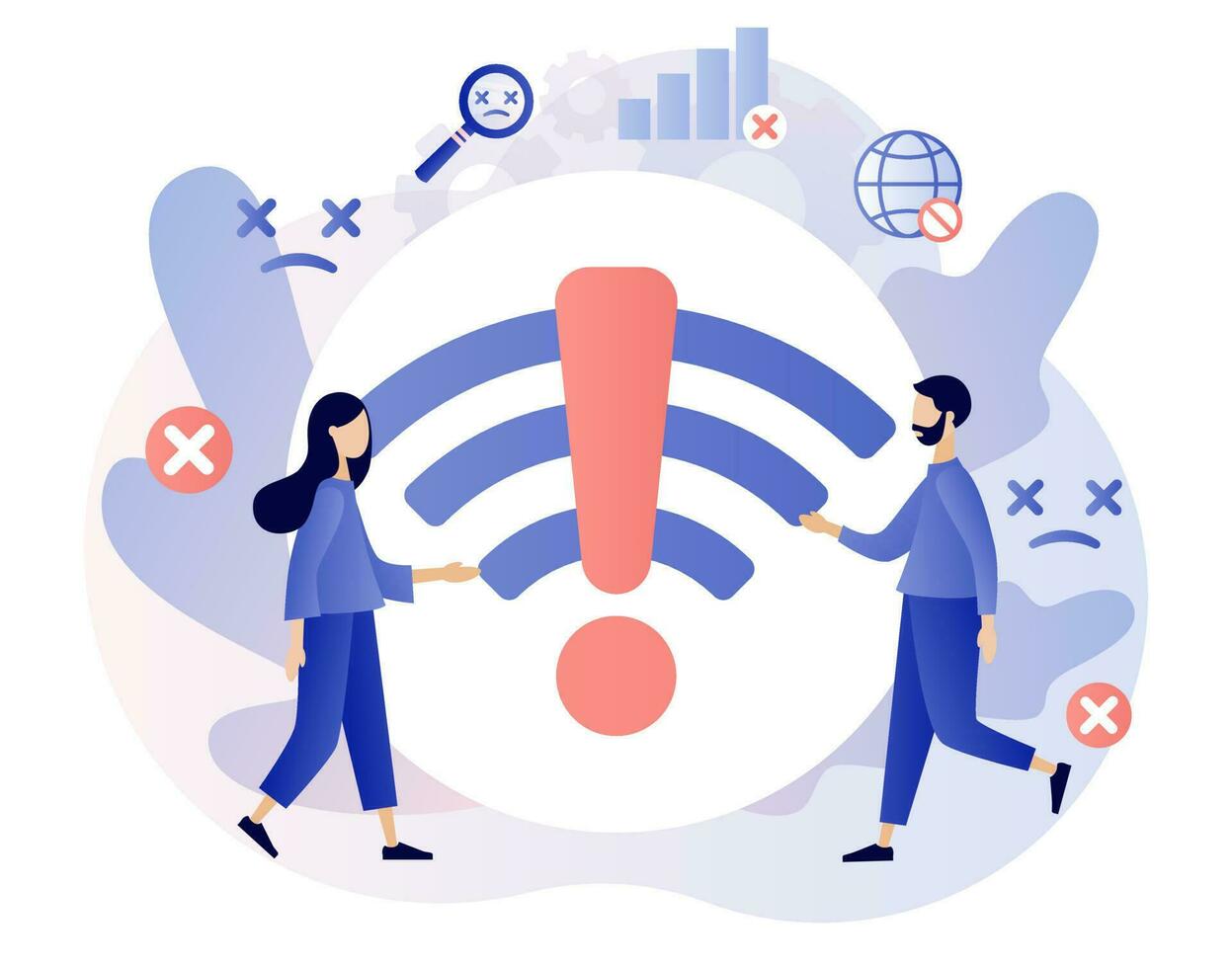Despite growing awareness of the detrimental impact of internet shutdowns, these digital lockdowns continue to plague the world, disproportionately impacting Africa. A damning new report by Top10VPN, a London-based VPN research firm, lays bare the true cost of this digital censorship: a staggering $9.01 billion to the global economy in 2023, with Sub-Saharan Africa bearing the brunt of the financial and human impact.
While global losses saw a decrease compared to the previous year’s $24.61 billion, the situation in Sub-Saharan Africa paints a starkly different picture. The region witnessed a fivefold increase in economic losses, jumping from $295 million in 2022 to a staggering $1.74 billion in 2023. This dramatic climb, fueled by over 30,785 hours of internet blackouts across 25 countries, left 84.8 million people disconnected and economies reeling.
Europe, with $4.02 billion in losses, topped the charts in terms of absolute cost. However, Sub-Saharan Africa’s relative increase from fourth to second place on the global index underscores the alarming pace at which internet shutdowns are proliferating in the region.
Ethiopia, Africa’s second most populous nation, remains the continent’s undisputed “internet shutdown capital.” In 2023, the East African nation suffered a staggering $1.59 billion Ghana Anticipates Whopping $1.15 Billion Boost! IMF and World Bank Set to Inject Financial Surge by Late February! loss, a steep rise from $179.9 million the previous year. Algeria and Senegal followed in the unenviable rankings, with internet blackouts costing them $101.9 million and $57.5 million respectively.
These figures represent more than just numbers on a spreadsheet; they translate to disrupted businesses, hampered communications, and stunted economic growth. In Ethiopia, for instance, government-imposed internet shutdowns during regional tensions effectively cut off the Amhara region, depriving millions of vital communication and economic opportunities.
The rationale for these shutdowns varies, ranging from electoral protests and conflicts to information control and military coups. In each case, the consequences are profound: stifled civil discourse, disrupted access to critical information, and economic kerugian that ripple through communities and businesses.
Top10VPN’s report utilizes the COST tool, a data-driven platform developed by internet monitoring NGO Netblocks, to quantify the economic impact of these shutdowns. This tool takes into account factors like GDP, internet penetration, and the duration of outages to estimate the financial losses sustained.
However, the true cost of internet shutdowns extends far beyond quantifiable economic metrics. They represent a chilling attack on fundamental human rights, restricting access to information, silencing dissenting voices, and hindering the free flow of ideas.
The global community must stand together to condemn these digital dictatorships and advocate for open and accessible internet for all. Governments, businesses, and civil society organizations have a responsibility to hold perpetrators accountable and push for policies that safeguard online freedom.
By shining a light on the exorbitant cost of internet blackouts – both economic and human – Top10VPN’s report serves as a vital wake-up call. It is a powerful reminder that the fight for an open and connected internet is far from over, and that protecting this fundamental right requires unwavering vigilance and collective action.
In conclusion, this post It highlights the human impact of internet blackouts, specific cases like Ethiopia, and underscores the broader implications for civil liberties and economic development

While the global discourse surrounding the harmful effects of internet shutdowns grows louder, the practice continues to cast a shadow across Africa. A stark glimpse into this reality comes from Top10VPN’s report, revealing numerous instances where governments prioritized control over connectivity, jeopardizing not only economic well-being but also fundamental human rights.
Sudan: Quelling Conflict at the Cost of Connection
In April, amidst an armed conflict in Khartoum, Sudan’s telecom giant MTN, bowing to government pressure, shut down internet access for its customers. This digital curtain, drawn in the name of quelling unrest, plunged millions into virtual darkness, severing vital communication channels and crippling online businesses.
Algeria: Policing Exams with Connectivity Blocks
Algerian authorities took a similar approach in June, resorting to intermittent internet disruptions during high school baccalaureate exams. This attempt to curb cheating came at a steep price, silencing legitimate online discourse and hindering access to information for millions of users beyond the exam halls.
Senegal: Silencing Dissent in the Digital Sphere
A month later, Senegal opted for a similar path, pulling the plug on internet services following the arrest of opposition leader Ousmane Sonko. This act of digital censorship, aimed at controlling the spread of “hateful information,” effectively muzzled dissent and stifled free expression, leaving Senegalese citizens disconnected from vital online avenues of communication and protest.
Gabon: Election Day, No Internet Access
Gabon’s August presidential and legislative elections took place under an even more extreme digital blackout. As a military coup unfolded, multiple network providers went dark, cutting off internet access across the country for 87 hours. This blatant assault on digital rights inflicted an estimated $5.4 million loss, highlighting the economic repercussions of silencing entire populations.
Continent-Wide Trend: A Worrying Pattern Emerges
These are not isolated incidents. Guinea, Mauritania, Kenya, Tanzania, Chad, and Zimbabwe all recorded their own share of internet shutdowns throughout the year, raising serious concerns about a growing trend across Africa. Governments, in their pursuit of control, seem increasingly willing to sacrifice the economic benefits and fundamental rights of their citizens by pushing the “kill switch” on the internet.
Top10VPN’s report paints a chilling picture of a continent where digital freedoms are under constant threat. The human cost of these shutdowns, from stifled business opportunities to silenced dissent, is undeniable. As awareness grows, the onus is on both governments and international communities to hold each other accountable, ensuring that the right to access and navigate the online world is not arbitrarily yanked away for whatever perceived reason.
Source: Benjamin Dada



















Leave a Reply